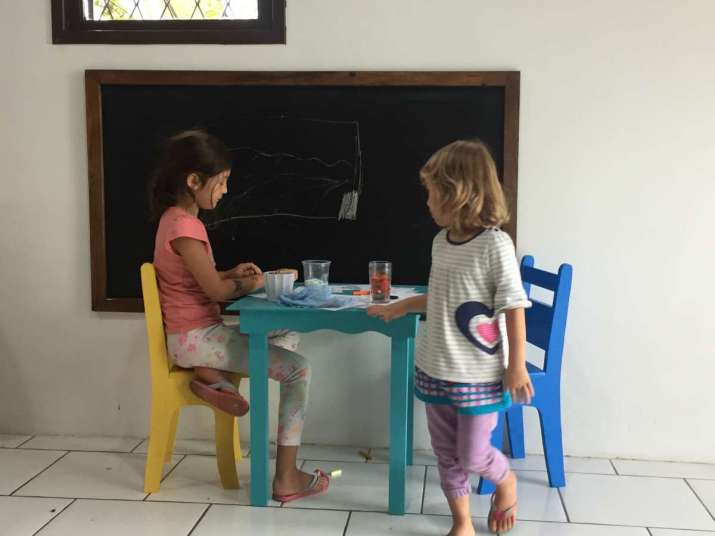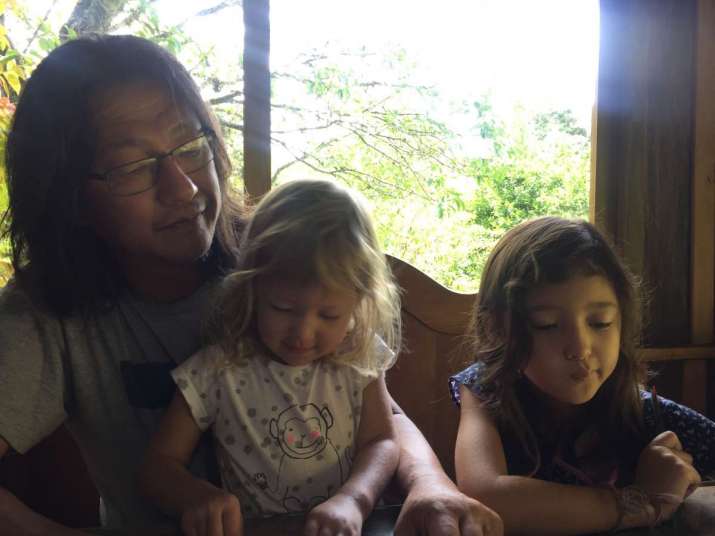FEATURES|COLUMNS|Buddhist Parenting (inactive)
The Ritual of Daily Routines
 Amaya and Leela playing together. Image courtesy of author
Amaya and Leela playing together. Image courtesy of authorAnother year has passed and my children are once again in the middle of their long school break, which started with the holiday season here in Brazil. The first few weeks were a delight, letting go of the school routine and enjoying long days together. After these first few weeks, however, I began to find it challenging to keep my daughters occupied and to work with them at home. The weather also didn’t help, fluctuating between heavy humidity and intense rain. As the girls were unable to play outside, they flopped around the house complaining, irritating each other, and demanding my attention. I felt an urge to return to the routine and structure that school days provide.
I mentioned to a sangha friend, an educator and runs a preschool, who came to visit that I felt like I was losing control of my daughters. As she was leaving, we were standing by the gate of my home, sweaty from the humidity, and she casually asked. “Do you have daily rituals?”
“Rituals?” I repeated, not quite sure what she meant. She explained: “Reading before bed, and other rituals like that.”
“Oh, yes,” I replied. “We read every night.” She smiled and said we could talk more later and went on her way. Her choice of the word “ritual” rather than “routine” stuck with me and I felt that I was having an “aha!” moment.
In Tibetan Buddhism, rituals are often used to support and enhance meditation. For example, before meditating, a practitioner might prepare a beautiful shrine, offer fragrant incense, and chant a melodic prayer. These steps create an inspiring environment for the practitioner to engage in meditation.
The support of such rituals has helped me many times by inspiring better behavior in the context of meditation practice, for example helping me to improve my focus and apply more diligence. This made me think that maybe, to survive the long holidays at home, I need to find ways to inspire better behavior in my daughters by creating a stimulating environment and not only by maintaining a routine.
As parents, I feel we often instinctively include rituals in our lives, for example when we prepare a hot bubble bath to encourage our little ones to bathe! “Look, a lovely bubble bath!” we tell them as we try to coax them into the bathroom. Recently, I have found that carefully setting the table for a meal and asking my daughters to assist helps them to focus on the meal and sit more readily.
For years I have heard and seen how routine and structure are important for children, and this has been a learning curve for me as I am generally quite flexible about our domestic routine. Thinking of the ritualistic aspect of routines helps me see things a little differently. How can I create the conditions to inspire healthy routines at home in the same way that Buddhist rituals help me to focus and be more attentive? If our children learn to be more attentive, even with daily tasks, it may be helpful for them now and when they grow up.
 Amaya and Leela studying with their father. Image courtesy of author
Amaya and Leela studying with their father. Image courtesy of authorMy husband is of Japanese descent and I see how he approaches many tasks differently than I usually would. I believe that this comes, in part, from the Japanese appreciation for ritual. For example, before cooking or even working at a table he meticulously prepares the workspace and all the elements that will be used. When it’s time to do homework, which for Amaya, who is now almost eight years old, is basically a daily exercise, her father reminds us to prepare and organize her study space before starting. I noticed that when we do this, rather than just setting up camp at a cluttered kitchen table, the study session goes much more smoothly.
Our children are still quite young and don’t seem to have the patience or the concentration skills to sit for formal meditation, as much as I would like them to. However, I feel that if I can help them learn to be more conscious and attentive during their daily tasks, it will open the gateway for attentiveness in other aspects of life. Creating positive conditions will help them build good habits and will create more space to be receptive.
Sometimes it feels like the unique chaos element that children bring to our adult life is something that only other parents can grasp, especially when children are little. We might have just sat down for a meal, and suddenly . . . “Mommy, I really have to poop, now!” While you preoccupy yourself with bringing her to the bathroom without any accidents, the other child starts calling from across the house: “Where is my favorite spoon?” Back at the table, the errant spoon is located then a cup is accidently knocked over, leaving peas swimming on the plate. One child starts laughing, the other starts to cry. And like that, a simple activity such as eating dinner turns into a series of unplanned dramas; a falling cascade of dominoes.
Practicing loving-kindness and patience is essential to parenting, but adding ritual to routine also seems like a helpful insight; not only so that we survive parenthood, but also to encourage healthy habits in our children. Now one of our household rituals before meals is not only washing our hands, but also going to the loo if needed!
Related features from Buddhistdoor Global
“Hyphenated-American”
Siri Kirin Kaur – Nourishing Home and Family with Yogic Practice
The Dakini at the Bus Stop














